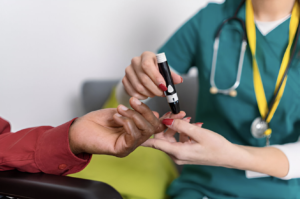Receiving a diabetes diagnosis can be overwhelming, especially when considering what to do if you find out you’re diabetic? it’s important to understand the immediate steps to take. Understanding the condition and taking immediate action can help you manage it effectively. In this article, we will explore what steps you should take after finding out you’re diabetic, from understanding the types of diabetes to lifestyle changes that can improve your health.
Understanding Diabetes
Diabetes is a chronic condition that affects how your body processes sugar (glucose). There are three primary types of diabetes:
- Type 1 Diabetes: An autoimmune condition where the body does not produce insulin.
- Type 2 Diabetes: The most common form, where the body becomes resistant to insulin or does not produce enough.
- Gestational Diabetes: A temporary condition that occurs during pregnancy.
Understanding how diabetes affects your body is crucial for managing it effectively. High blood sugar levels can lead to serious health complications, including heart disease, nerve damage, and kidney problems.
For comprehensive information on diabetes types and effects, check out the American Diabetes Association.
Immediate Steps After Diagnosis

Once you receive a diabetes diagnosis, the first step is to consult with your doctor. Your healthcare provider will help you:
- Create a management plan: Tailored to your specific type of diabetes and personal health needs.
- Understand your blood sugar levels: Learning to monitor your blood sugar is vital. You’ll want to know your target range to keep your levels stable.
Blood sugar monitoring can be done using a glucose meter or continuous glucose monitor (CGM). The goal is to maintain your levels within the target range set by your healthcare provider.
For more on monitoring and understanding blood sugar, visit the National Institute of Diabetes and Digestive and Kidney Diseases.
Advertisement
Lifestyle Changes
Dietary Adjustments
Making healthy dietary changes is essential for managing diabetes. Consider the following tips:
- Focus on whole foods: Incorporate more fruits, vegetables, whole grains, and lean proteins into your meals.
- Monitor carbohydrate intake: Carbs impact blood sugar levels; be mindful of portion sizes.
- Stay hydrated: Drink plenty of water and limit sugary beverages.
Incorporating Physical Activity
Regular physical activity is crucial in managing diabetes. Aim for:
- At least 150 minutes of moderate exercise each week: Activities can include brisk walking, cycling, or swimming.
- Strength training twice a week: This helps improve insulin sensitivity and manage weight.
Being active can also boost your mood and reduce stress, both of which are beneficial for overall health.
Emotional and Mental Health Considerations
Receiving a diabetes diagnosis can have a significant emotional impact. It’s important to acknowledge your feelings and seek support if needed. Consider:
- Talking to a mental health professional: They can help you cope with the emotional challenges.
- Joining a support group: Connecting with others facing similar challenges can provide comfort and advice.
Long-term Management Strategies
Regular Health Check-ups
Consistent health check-ups are vital for long-term diabetes management. Regular visits can help:
- Monitor complications: Your doctor can check for early signs of complications such as neuropathy or eye problems.
- Adjust your management plan: As your body changes, your treatment plan may need updates.
Managing Medications and Insulin
If prescribed, understanding your medications is crucial. Some tips include:
- Know your medications: Be aware of what each medication does and how it affects your body.
- Follow the prescribed insulin regimen: If using insulin, learn how to administer it properly.
FAQs
- What should I eat if I’m diabetic?
- Focus on whole foods, avoid processed sugars, and balance your meals with carbohydrates, proteins, and fats.
- How can I monitor my blood sugar at home?
- Use a glucose meter or CGM, as instructed by your healthcare provider.
- What are the signs of high blood sugar?
- Common signs include increased thirst, frequent urination, fatigue, and blurred vision.
Conclusion
In summary, understanding what to do if you find out you’re diabetic? will not only help you manage your health but also empower you to live a fulfilling life, Finding out you’re diabetic can feel daunting, but taking proactive steps can lead to a healthy and fulfilling life. Consult with your healthcare provider, make necessary lifestyle changes, and stay informed about your condition. Remember, managing diabetes is a journey, and support is available every step of the way.
Advertisement